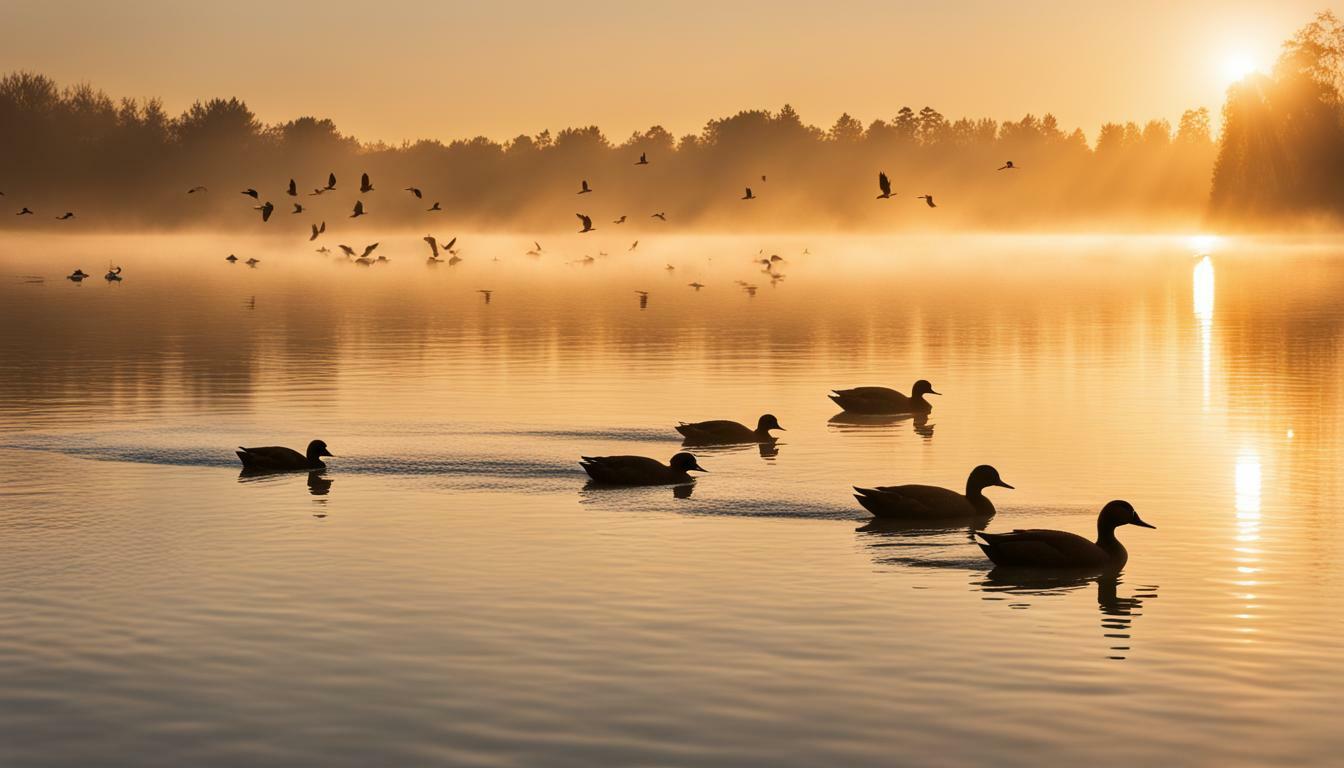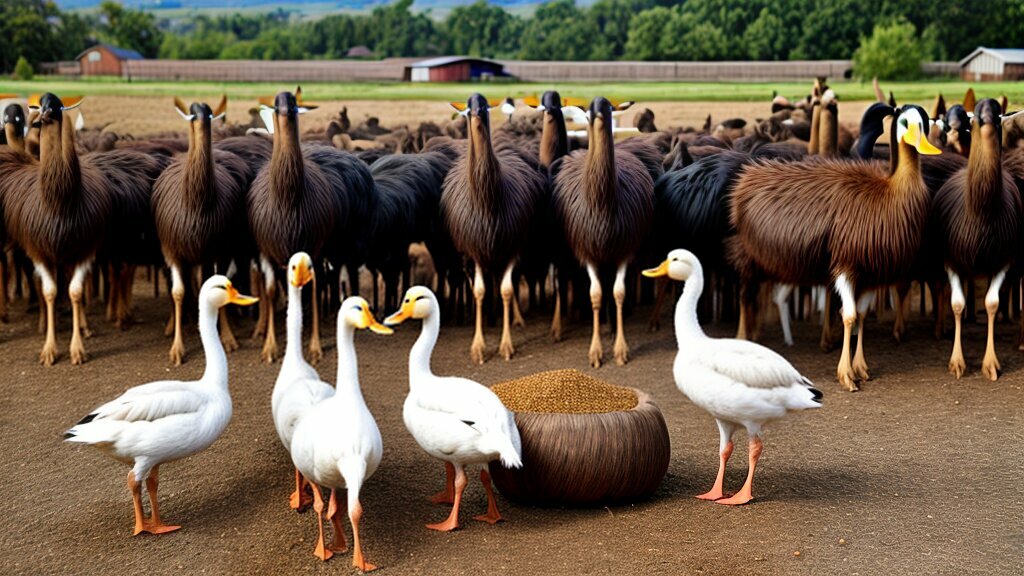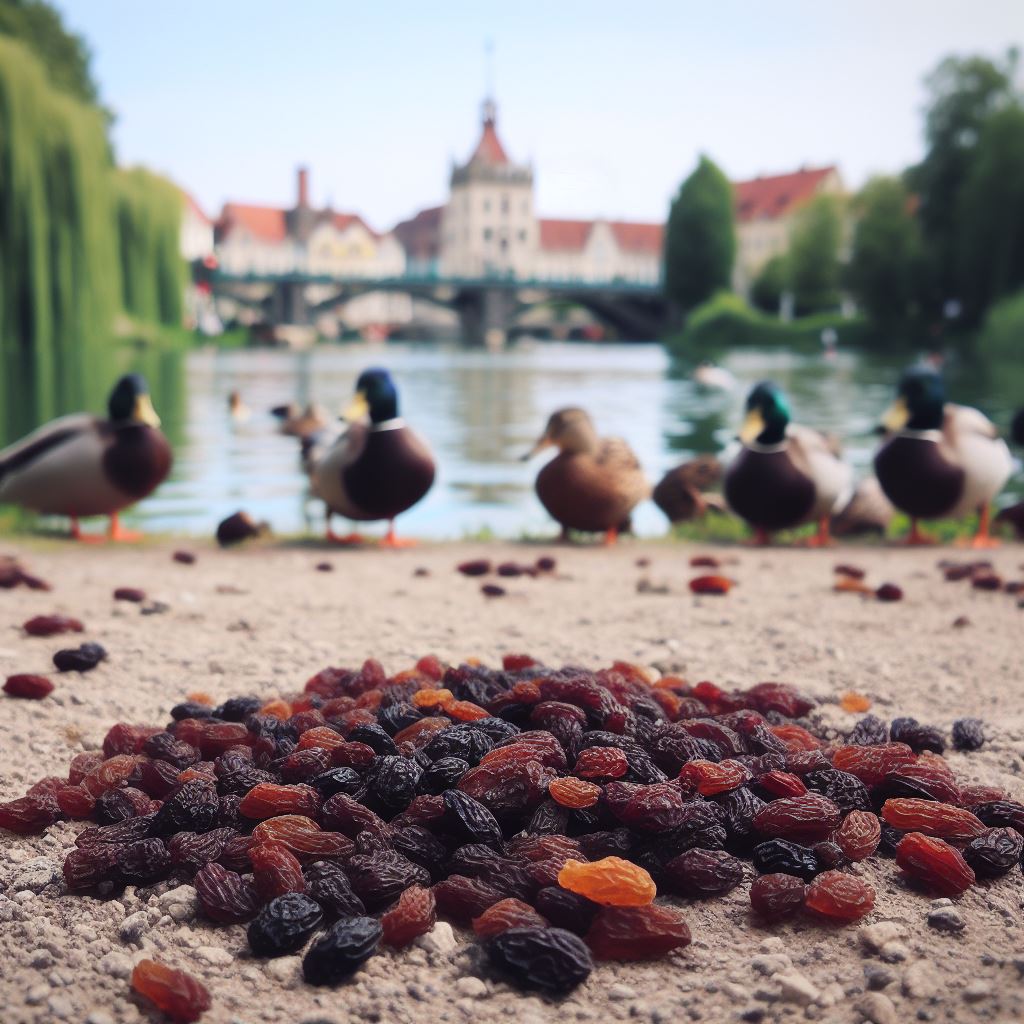What Time Do Ducks Wake Up? Discovering the Daybreak

Table of content:
- What Time of Day Do Wild Ducks Wake Up?
- What Causes Ducks to Wake Up So Early in the Morning?
- Do Ducks Wake Up at the Same Time Every Day?
- Why Do Ducks Wake Up Before Sunrise?
- Do Domestic Ducks Wake Up Earlier Than Wild Ducks?
- How Does the Weather Affect What Time Ducks Wake Up?
- Do Ducks Ever Sleep in and Wake Up Late?
- Conclusion
For people, waking up early usually requires an alarm clock. But ducks can’t set devices to rouse them at a specific time. So what governs their morning wake-up call? The answer has to do with evolution and the ducks’ natural body clocks.
Ducks are prey animals, so they must be vigilant to avoid predators. Waking up before sunrise gives them extra time to locate food while avoiding danger. Their wake-up times vary based on species, habitat, and other factors.
Below we’ll look at why ducks rise early, if captive ducks follow different schedules, how weather affects wake times, whether ducks ever sleep in, and more. Understanding duck waking patterns provides insight into their daily rhythms and behavior.
What Time of Day Do Wild Ducks Wake Up?
Most wild duck species awake well before sunrise. On average, wild ducks wake up 45 to 60 minutes before sunrise. However, their precise wake-up time depends on the season.
During spring and summer, wild ducks may get up as early as 4:30 am. At this time of year, days are longer. So if ducks woke up at sunrise, they’d miss prime feeding opportunities in the early morning. Waking up earlier allows them to find food and scout for predators with plenty of light.
In fall and winter when days are shorter, wild ducks may wake up around 5:30 or 6 am. This is about 30 minutes before sunrise. The extra sleep may help them conserve energy during colder months when food is scarcer.
Some ducks also adjust their schedules based on when certain food sources are available. For example, mallards may wake up around 3 am to take advantage of insects that are active just before dawn. Teal often rise before 5 am to search for seeds and aquatic invertebrates.
So while most wild ducks get up 45 to 60 minutes before sunrise, subtle variations in wake-up times exist between species and seasons. Their biological clocks fine-tune morning routines based on food availability, weather, and safety needs.
What Causes Ducks to Wake Up So Early in the Morning?
What drives ducks to leave their slumber while it’s still dark outside? The main factor is their circadian rhythms. Circadian rhythms are internal clocks that regulate sleep/wake cycles and other bodily functions. They encourage wakefulness even without light cues.
Ducks may have evolved early rising circadian rhythms to avoid nocturnal predators. Foxes, raccoons, coyotes, and owls all hunt at night. Waking before these threats are active improves ducks’ odds of survival. Their circadian clocks adapted to make early waking habitual.
Another influence is light sensitivity. Ducks may detect very subtle changes in light 30 to 60 minutes before sunrise. These dim light cues activate brain regions governing alertness. Light enters ducks’ eyes and stimulates arousal when it’s still too dark for humans to notice.
Hunger likely adds to their impetus. Ducks have high metabolisms and must eat frequently. Waking early provides extra time to forage so their energy needs are met. It also gives ducks first dibs on food like aquatic plants before other animals consume it.
Do Ducks Wake Up at the Same Time Every Day?
Do ducks have a fixed wake-up time, or does it fluctuate day to day? Research shows most duck species are quite consistent in their daily morning routine.
Of course, small variations happen. On a rainy morning, ducks may wake up 15 minutes later than average to avoid getting wet. During migration or molting season, they may sleep a bit extra to conserve energy.
But overall, a duck’s circadian rhythm keeps their wake time locked within a tight window each morning. Sleep studies performed on mallard and wood ducks found their wake times only varied by 7 to 15 minutes daily. This precision helps the ducks maintain stable bodily processes.
Ducks derive security from routine. Keeping a steady schedule allows them to stay vigilant of threats. Random wake-up times would leave them vulnerable. Evolution has instilled ducks with rigid circadian cycles so they awake every day at virtually the same time.
However, one exception exists. Some species like the cinnamon teal experience wider normal fluctuations. These ducks may naturally vary wake times by 30 minutes or more daily based on habitat and other needs. Still, their rhythms prevent extreme inconsistencies.
So while slight flexibility occurs in some ducks, most adhere to a precise morning clock. This programming aids their health and safety in the wild.
Why Do Ducks Wake Up Before Sunrise?
Waking while it’s still dark out seems like an odd choice. Why not sleep in until sunrise when light allows for safer foraging? Ducks wake early because the benefits of rising before light outweigh the risks.
The pre-sunrise period gives ducks more time to feed undisturbed. Competition for food resources is lower, letting them fuel up efficiently. It’s also easier to evade predators in dim light when they are less active. And ducks can scout which feeding spots are safest before other birds occupy the space.
Additionally, some types of food are only available early in the morning. Aquatic invertebrates and seeds sink or get consumed as the day progresses. Waking early allows access before they disappear.
Being active pre-sunrise also lets ducks take advantage of cooler temperatures. Heat stresses ducks and makes flying and foraging overly tiring. Feeding in the coolest part of day saves energy.
Do Domestic Ducks Wake Up Earlier Than Wild Ducks?
Do domestic ducks pop up at dawn like their wild cousins? Interestingly, the influence of humans leads to some different waking behaviors.
On farms, domestic ducks don’t face the same pressures of predation and competition for resources as wild ducks. So they have more flexibility in their wakeup times. However, farmers often control the schedule of domestic ducks.
Ducks raised for eggs or meat need lighting schedules optimized for production. Farmers will simulate a sunrise one to two hours before the real daybreak. This artificial sunrise spurs activity levels and primes ducks for eating.
So while wild ducks wake at sunrise, domestic ducks wake up one or two hours earlier. But it’s not due to an innate drive – their internal rhythms alone wouldn’t cause such early rising. The artificial sunrise farmers use initiates waking at this unnatural time.
Pets and hobby ducks demonstrate more varied waking times. Without the rigid schedule of farms, they wake closer to normal daylight hours. However, they still may get up somewhat earlier than wild ducks. The presence of human caretakers relieves pressure to maximize foraging time pre-sunrise.
How Does the Weather Affect What Time Ducks Wake Up?
Do ducks sleep in on cold or stormy mornings? Weather can impact waking times, but often not drastically. Ducks have hardy constitutions adapted for diverse conditions.
During winter, ducks may wake 10 to 20 minutes later during extremely icy temperatures or windstorms. The delayed start allows them to avoid the worst early morning chill before sunlight warms the air.
Heavy rain can also cause ducks to remain sleeping later. Emerging into a deluge at dawn could endanger newly hatched ducklings. So mothers may wait until precipitation lightens up before venturing out.
But in general, ducks are well equipped to tolerate weather extremes. Thanks to dense, oiled feathers and thick down, they maintain adequate warmth and dryness. Their circadian rhythms resist disruptions from less than ideal conditions.
Hot summer days have little effect on duck wake times. Though they prefer cooler temperatures, heat doesn’t deter them from keeping a normal schedule. That said, they may spend more time resting in shade to prevent overheating.
Influences like early migration needs and food availability outweigh minor weather effects. Unless conditions are severe and dangerous, ducks wake up at their usual early hour. Staying on rhythm takes priority over extra rest.
So while inclement weather can slightly delay ducks, their strong constitutions and ingrained rhythms generally keep wake times consistent. They are well adapted to shrug off poor conditions and stick to routine.
Do Ducks Ever Sleep in and Wake Up Late?
Given their rigid programming, is it ever possible to catch ducks oversleeping? On rare occasions, certain factors can throw off their biological clock and routine.
Sickness and injury are common reasons for uncharacteristically late waking. Ducks rely on foraging to meet high calorie needs. So when ill or hurt, their systems are deprived of nutrition and rest. This can disrupt circadian cycles and energy levels.
Egg laying and molting also demand extra recovery time. Ducks may sacrifice an hour or two of morning foraging to rest during these energy-draining periods. The highest sleeping-in likelihood is for females incubating a nest. They often rely on stored energy reserves to minimize leaving eggs.
Migration is another exception. Traveling thousands of miles is exhausting. Ducks may awaken later than usual to recover strength at stopover resting sites. Day length also fluctuates during migration, confusing their innate circadian sense.
Outside of these examples, ducks rarely wake up late. However, a few rare cases exist of individuals that habitually sleep in. These odd ducks defy explanations but demonstrate that flexibility is possible under special circumstances.
Conclusion
We often underestimate the regimented lives of animals like ducks. But they adhere to precise schedules tuned over eons of evolution. Their waking habits provide unique insights.
Rising before the sun emerges shows how ducks prioritize survival needs like safety, nourishment and energy conservation. Thanks to keen circadian clocks, most wild ducks awake within minutes of the same time daily. This routine likely persists barring illness, migration or nesting duties.
Domestic ducks demonstrate more flexibility in wake times, but farmers often impose artificially early schedules. In the end, ducks are finely programmed to seize each morning despite the pre-dawn darkness. Whenever the quacking starts, the duck day has begun!
Understanding why and when ducks wake gives us an appreciation for their complex biology. It also hints that humans didn’t corner the market on morning psychology. Ducks too have their own rituals for greeting each new day.
Welcome. I’m Adreena Shanum, the proud owner of this website, and I am incredibly passionate about animals, especially poultry. I founded adreenapets.com as a labor of love, stemming from my desire to share my knowledge and experiences with poultry enthusiasts worldwide.




